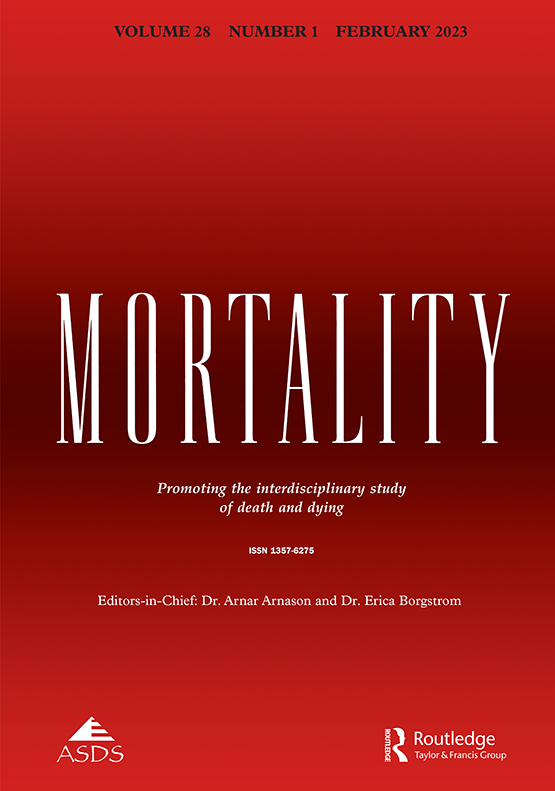Constitution of the Association for the Study of Death and Society (ASDS)
Agreed by Council 14 May 2019
1 NAME
The Association’s name is the Association for the Study of Death and Society.
2 THE PURPOSES OF THE ASSOCIATION ARE:-
To promote the study of death in the arts, humanities, social and allied sciences. To this end, the Association will:
- Foster and promote publication, conferences and multidisciplinary networks
- Support academic professional development
- Promote high quality, ethical research
- Shape and influence policy and practice agendas
- Support the teaching of death studies
- Promote the widespread recognition of death studies
- Represent the interests of the membership
3 COUNCIL
The Association shall be managed by a Council whose members are appointed at the Annual General Meeting (AGM) of the Association.
This Council shall be composed of between six (6) and fifteen (15) members at any one time, to include a President, Secretary, Treasurer, Membership Secretary, Website Manager, PGR Representative, Postdoctoral Scholars’ Representative and General Members. Council may also at its sole discretion co-opt members as required.
All Council terms of office shall normally commence and end at an AGM.
The Secretary, Membership Secretary, Treasurer and all other Council members shall serve a two or four year term of office, to be agreed in consultation with Council. They shall be selected by Council following a nomination process, and their selection shall then be presented for ratification by the AGM prior to commencement of their term of office. Following the end of their terms of office, outgoing Council members shall be allowed to stand for re-election to any office at any time.
The Postgraduate Representative shall be elected by postgraduate members of ASDS following a nomination process, and their selection shall then be presented for ratification by the AGM prior to commencement of their term of office. They shall serve for a fixed term of two years and have full voting rights. Following the end of their term of office, the outgoing Postgraduate Representative shall be allowed to stand for re-election to any office at any time.
Every fourth year the Association shall choose a President-elect, who shall then serve as President for one four-year term of office. The President shall normally be a current or previous member of the Association and their selection shall then be presented for ratification by the AGM prior to commencement of their term of office. Following the end of their term of office, outgoing Presidents shall not normally be allowed to stand for any Council office within the following four years.
All Council members, whether elected or ex officio, must be fully paid up members of the Association at the time of their election/co-option and throughout their term of office unless Council agrees otherwise.
4 CARRYING OUT THE PURPOSES
In order to carry out the Association’s purposes, the Council has the power to:
- raise funds, receive grants and donations
- apply funds to carry out the work of the Associations
- co-operate with and support other organisations and with similar purposes
- do anything which is lawful and necessary to achieve the Association’s purposes
5 MEMBERSHIP
The Association shall have a membership. Individuals and organisations who support the work of the Association and are aged 18 or over, can apply to the Council to become a member. Once accepted by the Council, membership lasts for 1 year and may be renewed. The Council will keep an up-to-date membership list.
The Council may remove a person’s membership if they believe it is in the best interests of the Association. The member has the right to be heard by the Council before the decision is made and can be accompanied by a friend.
6 ANNUAL GENERAL MEETING – AGM
- The AGM must be held every year, with 14 days’ notice given to all members telling
them what is on the agenda. Minutes must be kept of the AGM.
- There must be at least 15 members or 10% of the membership, whichever is the less, present at the AGM.
- Every individual member has one vote. For voting purposes each organisational member has one vote.
- The Council shall present the annual report and accounts.
7 COUNCIL MEETINGS
- Council must hold at least 3 meetings each year. Council may act by majority decision.
- At least five (5) Council members must be present at the meeting to be able to take decisions. Minutes shall be kept for every meeting.
- If Council members have a conflict of interest they must declare it and leave the meeting while this matter is being discussed or decided.
- Council may make reasonable additional rules to help run the Association. These rules must not conflict with this constitution or the law.
8 MONEY AND PROPERTY
- Money and property must only be used for the Association’s purposes.
- Council must keep up to date accounts. The most recent annual accounts can be seen by anybody on request.
- Council members cannot receive any money or property from the Association, except to refund reasonable out of pocket expenses.
- Money must be held in the Association’s bank account. All payments must be authorised by a designated bank signatory.
9 GENERAL MEETINGS
If Council considers it is necessary to change the constitution, or wind up the Association, they must call a General Meeting so that the membership can make the decision. Council must also call a General Meeting if they receive a written request from the majority (51%) of members. All members must be given 14 days notice and told the reason for the meeting. All decisions require a two thirds majority of those members present. Minutes must be kept.
- Winding up – any money or property remaining after payment of debts must be given to an organisation with similar purposes to this one.
- Changes to the Constitution – can be made at AGMs or General Meetings.
- Council may also call a General Meeting to consult the membership.
10 SETTING UP THE ASSOCIATION
The Association was established on 23 June 2009 – previous versions of the Association’s constitution refer.
This version of the Association’s constitution was adopted on 14 May 2019 by the people present at the Council meeting on that date (minutes refer).

